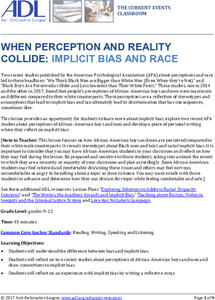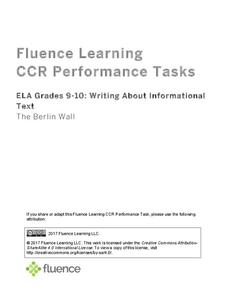Workforce Solutions
Discover Your Interests
For many high schoolers, what they want to be when they grow up can be very intimidating. Here's an activity that gets them thinking about their interests and how they might connect these interests to future jobs. After watching a short...
National History Day
Challenging the Status Quo: Women in the World War I Military
Why are some so resistant to change? The status quo is often to blame for a lack of forward movement in society. Following the events of World War I, women in America suddenly had a voice—and were going to use it. Scholars use the second...
Shakespeare Globe Trust
Macbeth
Why do characters do what they do? Scholars use the resource to explore character motivation in Shakespeare's tragedy Macbeth. Additionally, they discover pictures, interviews, and videos from the Deutsche Bank production of the play.
Curated OER
Don't Let the Earth Down
Writing a persuasive argument starts with a clear thesis. Using this resource, your class will write a persuasive paper on a conservation issue. They will then transform their argument into a 30-second public service announcement. If...
Curated OER
The Impact of the Civil Rights Movement
Deepen understanding of the Civil Rights Movement with this collection of primary documents. This resource contains 22 video transcripts about desegregation, voting rights, black power, Dr. Martin Luther King Jr., and more. You might...
Curated OER
Meet the Artist
Young scholars produce a video essay in iMovie about an artist told from the artist's point of view. They also create original works of art in the style of the artist for an iPhoto slide show.
Curated OER
Young Learner's Writing Workshop 1
Middle schoolers become familiar with writing an essay in English. They are given an overview of basic essay writing styles. Students develop skills that are used when analyzing texts as the basis of their essays.
PBS
Explicit and Implicit Language – Interpreting the Meaning of the Fourteenth Amendment
How do Supreme Court justices interpret amendments to the Constitution? The resource helps answer that question by discussing how people use explicit and implicit language to interpret the meaning of the Fourteenth Amendment. Learners...
National Endowment for the Humanities
Kate Chopin's The Awakening: Searching for Women and Identity in Chopin's "The Awakening"
The final lesson plan of a three-part series on Kate Chopin's The Awakening has scholars investigate life as a woman in late nineteenth-century America. They research the role of women in society through the eyes of the characters in the...
NPR
The History of America’s Weed Laws
To understand the laws regarding marijuana use in the United States, you can go all the way back to the 1800's to learn about farming hemp, or you can go back to 2018 when California became the sixth state to legalize recreational...
West Virginia Department of Education
Editorials: The Guiding Voice of Authority?
How much can opinion influence a news story? A standalone resource discusses the importance of John Brown's Raid through the lens of journalism. Learners analyze two different texts, one from the perspective of the North and the other of...
California Department of Education
Telling My Story
Crafting a personal statement for college admissions, job applications, or other post-high school programs does not have to be a nightmare. The "Telling My Story" packet describes the key components of successful essays and includes...
Anti-Defamation League
When Perception and Reality Collide: Implicit Bias and Race
The big idea in this lesson is that implicit bias often clouds perceptions. High schoolers watch a short video, read research articles, and engage in discussions about implicit bias and how these biases lead to stereotyping. They craft...
Global Oneness Project
A Vanishing Island
The effects of rising sea levels on Isle de Jean Charles, located off the coast of Louisiana, are documented in Emmanuel Vaughan-Lee's poignant short video. Viewers are asked to consider not only the plight of residents but also what...
Middle Tennessee State University
The Declaration of Independence: Its Legacy and Ideas in Today’s World
How is it possible that such an old document still triggers modern discussions? Teach scholars why the Declaration of Independence is still so important today using an informative resource. They watch various educational videos, work in...
PBS
Latino Americans Share Their Experiences
Three Latino Americans are the focus of an interactive that spotlights their accomplishments. Scholars get to know Lin-Manuel Miranda, Judy Reyes, and José Hernández through short informative text and videos. Participants read, take...
Facing History and Ourselves
Why Little Things Are Big
Often our decisions are impacted by a fear of how others see us. That's the big idea in a two-day instructional activity that asks how false assumptions, how our fear of how others may see us, impact how we act. After watching a video...
NASA
The Big Climate Change Experiment Lesson 2: The Influence of Climate on Culture
No conversation about culture is complete without considering climate. Scholars first view videos of climate witnesses who describe the climate in their regions and how climate change affects their daily lives. They then write essays or...
Anti-Defamation League
What are Reparations and Should We Enact Them?
Young social scientists investigate recent legislative proposals for reparations for African Americans. They examine the rationale behind the proposals by viewing videos and reading related articles. To close the instructional activity,...
Curated OER
House and Holmes: A Guide to Deductive and Inductive Reasoning
Test your pupils' reasoning skills with several activities and a quick mystery to solve. Learners watch and analyze a few video clips that demonstrate reasoning in action, practice deduction with an interactive and collaborative...
Fluence Learning
Writing About Informational Text The Berlin Wall
On June 26, 1963 President John F. Kennedy delivered his famous "Ich bin ein Berliner" speech close to the Berlin Wall at the Rudolph Wilde Platz. On June 12, 1987 President Ronald Reagan Delivered his famous "Mr. Gorbachev, tear down...
University of California
The Vietnam War (1945 – 1975)
Have you ever wanted to do something so perfectly you wound up not doing it well at all? Young historians use primary and secondary documents to analyze the United States involvement in the Vietnam War. The issues surrounding the...
Oklahoma Bar Association
Into Which Caste Have You Been Cast?: India's Caste System
What was it like to fit into a certain class with no choice in the matter? Learners experience the caste system in a role-play activity, work individually on handouts to enhance their learning, and participate in an evaluation activity...
WE Charity
High School–Module 3: Food Waste
Advances in packaging and refrigeration help keep food fresher longer. That's just one of the ways science is addressing global food waste. With the third of five lessons from the WE Are Innovators—High School Modules set, scholars use...

























